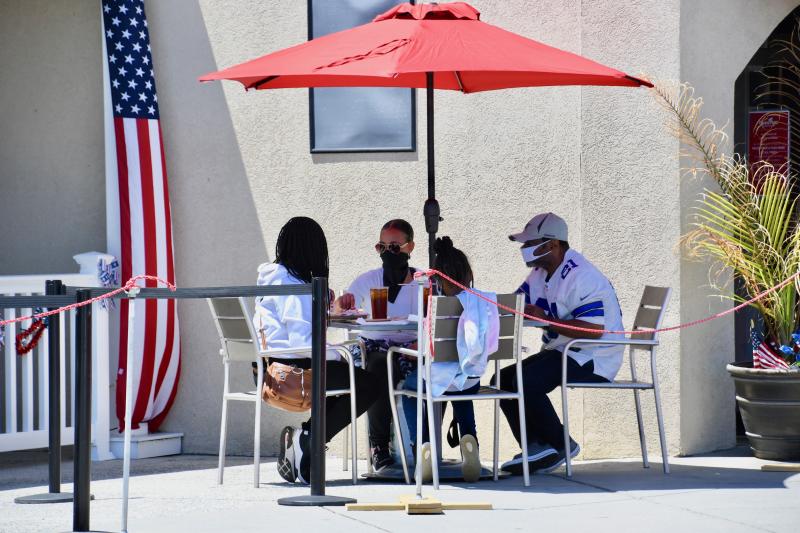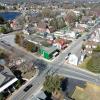Businesses welcomed the second phase of reopening Delaware's economy as it kicked off June 15, but some have been left wondering what the future holds, especially those who cannot increase capacity under strict social distancing guidelines.
“If I am a restaurant and my walls are only so many feet apart and I'm having to do social distancing with my tables inside of those walls, I can't go any bigger than I am right now,” said Carol Everhart, president and chief executive officer of the Rehoboth Beach-Dewey Beach Chamber of Commerce. “Some of them can do outside dining, but there is an issue with restaurants not being able to change anything unless it goes back to normal.”
Under Phase 2 guidelines for reopening created by Gov. John Carney, restaurants, eateries and retail stores are now allowed to expand to 60 percent of fire code capacity, up from 30 percent capacity allowed when the first phase of reopening began June 1.
Although more capacity is allowed, state guidelines require tables and booths be arranged in a way that ensures seated customers are at least six feet apart from seated customers at nearby tables. Typically, guidelines state, every other booth would be used. For free standing tables with pull out chairs, the distance increases to 8 feet in between tables.
Customers must have a reservation and wear a face covering until seated with their group. Bars are also open under Phase 2, but social distancing must be practiced, according to guidelines.
“As long as the social distancing between the tables is in there, [restaurants] have done what they can do, for many of them,” Everhart said. “That is a really big concern for their viability.”
Tony Gouvas, co-owner of Louie’s Pizza, said the eatery had just started to open for the season when the COVID-19 pandemic hit. He said Louie’s typically has steady carry-out during the week with more dine-in customers on the weekend, but the virus and resulting shutdown have wreaked havoc on the restaurant’s business model.
“Overall it caused us to lose two-and-a-half months worth of business that we will never get back. At one point we were down 90 percent in business, and we still had overhead and bills to pay as well as employees,” Gouvas said.
For now, he said, Louie’s will adjust its employee numbers, product orders and other business expenditures depending on how busy they are, and then hire more employees as summer goes on.
Gouvas said they do not plan to have outdoor seating, so the expanded capacity does not make much difference for them. “It would make a confusing situation more confusing, by having people just sit in the seats either waiting for their carry-out food or a passerby that just wants to sit and rest,” he said.
Farther down Rehoboth Avenue, Nick Caggiano Jr., co-owner of Nicola Pizza, said Nicola won’t get too many more seats at its Rehoboth Avenue location with the expanded capacity. With bars now allowed to open, Caggiano said he expects 10 to 12 seats from that. At the original North First Street restaurant, Caggiano said they will get an extra 15 seats. “It’s helped,” he said.
Overall, Caggiano said Nicola has been busy, down only 10 percent compared to the prior year.
Lewes Chamber of Commerce Executive Director Betsy Reamer said many downtown restaurants will not open to in-person dining in the second phase, and will stick with curbside and takeout service, which has been allowed since the business shutdown in March.
“Many of our small businesses in the historic district can’t even get to 30 percent because of the configuration required by the state for eight feet between tables,” she said. “None of them in the historic district have the capacity to extend their outdoor space.”
In Milton, Irish Eyes has welcomed a return of customers with outdoor seating. “We have always appreciated our customers' support, but they have really stepped it up. It was nice to see all the familiar faces,” said Maryellen Kiernan, events and marketing director for Irish Eyes.
Both Gouvas and Caggiano said they are looking forward to more business when the third reopening phase begins. “Once Phase 3 comes, we will simply get busier,” Gouvas said. “Business has already picked up. I figured it would, once the weather became warmer and people simply became tired of staying home. What’s the old saying, ‘You cannot cage an animal forever.’”
But Everhart, whose chamber represents about 1,200 businesses, said many are wondering what's next.
“We don't know what's going to happen in Phase 3. We don't have guidelines,” she said.
Businesses need to know what the next guidelines are, and whether those guidelines will be released in the next two or three weeks, she said. “Otherwise they can't get ready,” she said.
In his June 12 press conference, Carney briefly mentioned Phase 3, saying as long as data such as hospitalizations, critically ill, and percent of positive COVID-19 cases continue to decline, it is a good indicator that the economy is ready to open up more. Moving forward, he said, the state's nascent contact tracing program is an important factor to help control the spread. “As you reopen, that's how you control it. You're isolating individuals. You test them, you test more intensely, and hopefully identify more immediately, and then isolate to prevent the spread,” he said.
Everhart notes there have been some positives as restrictions have eased - increased rentals, more retail sales - but she fears there are some businesses that will not recover from the shutdown.
“I do not think every one will make it,” she said. “Clearly there are those who will not be able to recover from this.”
Staff writer Nick Roth contributed to this article.






















































